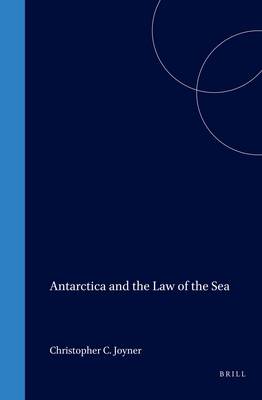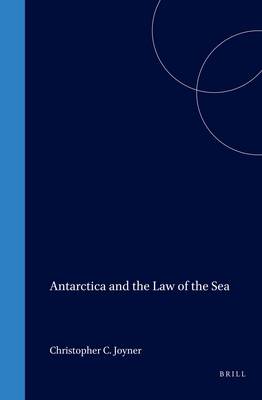
En raison d'une grêve chez bpost, votre commande pourrait être retardée. Vous avez besoin d’un livre rapidement ? Nos magasins vous accueillent à bras ouverts !
- Retrait gratuit dans votre magasin Club
- 7.000.000 titres dans notre catalogue
- Payer en toute sécurité
- Toujours un magasin près de chez vous
En raison de la grêve chez bpost, votre commande pourrait être retardée. Vous avez besoin d’un livre rapidement ? Nos magasins vous accueillent à bras ouverts !
- Retrait gratuit dans votre magasin Club
- 7.000.0000 titres dans notre catalogue
- Payer en toute sécurité
- Toujours un magasin près de chez vous
Description
Antarctica and the Southern Ocean cover one-tenth of the earth's surface. In a legal and environmental sense, Antarctica represents the geography of hope. It is the freshest and most pristine of regions, governed by a legal regime that offers Antarctica and its circumpolar water the unique possibility of becoming the world's first global wilderness preserve.
But in today's age of resource scarcity, Antarctica still provokes much political, economic and legal debate. Over the past decade, international attention has increasingly focused on the legal status of the continent, the potential for hydrocarbon exploitation offshore, and opportunities for harvesting circumpolar living marine resources. In this fascinating treatment, Christopher C. Joyner undertakes the first serious examination of the intimate relationship between Antarctica and the law of the sea. Using Antarctica as a case study, Joyner probes large conceptual issues of ocean law and politics. He uses the intricate details of oceanography and law to unravel the dynamics of the Antarctic Treaty System. In doing so, he examines how the changing importance of Antarctic issues has affected the development of the law of the sea for the region, the ways in which states define their national interests, and the accommodation through various negotations that have contributed to the development of law for governing the Southern Ocean.
While the study of law for the Antarctic is provocative in itself, this work goes much farther. The study critically analyzes the region's biogeography, the condition of sovereignty on the continent, the lawfulness of asserting jurisdictional zones offshore, and various legal implications for Antarctica's continental shelf, local island groups, circumpolar deep seabed, and the Southern Ocean's high seas. Moreover, the special legal efforts by the international community to protect the Antarctic seas from marine pollution and to conserve its living marine resources are comprehensively appraised.
Thorough, authoritative, and objectively reasoned, Antarctica and the Law of the Sea provides an insightful assessment of how law can progressively develop for a resource-rich region of the world's ocean. As such, it should appeal to a broad range of international lawyers and social scientists who are interested in international relations, political economy, environmental politics, and the law of the sea.
But in today's age of resource scarcity, Antarctica still provokes much political, economic and legal debate. Over the past decade, international attention has increasingly focused on the legal status of the continent, the potential for hydrocarbon exploitation offshore, and opportunities for harvesting circumpolar living marine resources. In this fascinating treatment, Christopher C. Joyner undertakes the first serious examination of the intimate relationship between Antarctica and the law of the sea. Using Antarctica as a case study, Joyner probes large conceptual issues of ocean law and politics. He uses the intricate details of oceanography and law to unravel the dynamics of the Antarctic Treaty System. In doing so, he examines how the changing importance of Antarctic issues has affected the development of the law of the sea for the region, the ways in which states define their national interests, and the accommodation through various negotations that have contributed to the development of law for governing the Southern Ocean.
While the study of law for the Antarctic is provocative in itself, this work goes much farther. The study critically analyzes the region's biogeography, the condition of sovereignty on the continent, the lawfulness of asserting jurisdictional zones offshore, and various legal implications for Antarctica's continental shelf, local island groups, circumpolar deep seabed, and the Southern Ocean's high seas. Moreover, the special legal efforts by the international community to protect the Antarctic seas from marine pollution and to conserve its living marine resources are comprehensively appraised.
Thorough, authoritative, and objectively reasoned, Antarctica and the Law of the Sea provides an insightful assessment of how law can progressively develop for a resource-rich region of the world's ocean. As such, it should appeal to a broad range of international lawyers and social scientists who are interested in international relations, political economy, environmental politics, and the law of the sea.
Spécifications
Parties prenantes
- Auteur(s) :
- Editeur:
Contenu
- Nombre de pages :
- 316
- Langue:
- Anglais
- Collection :
- Tome:
- n° 18
Caractéristiques
- EAN:
- 9780792318231
- Date de parution :
- 01-09-92
- Format:
- Livre relié
- Format numérique:
- Genaaid
- Dimensions :
- 157 mm x 239 mm
- Poids :
- 589 g

Les avis
Nous publions uniquement les avis qui respectent les conditions requises. Consultez nos conditions pour les avis.






